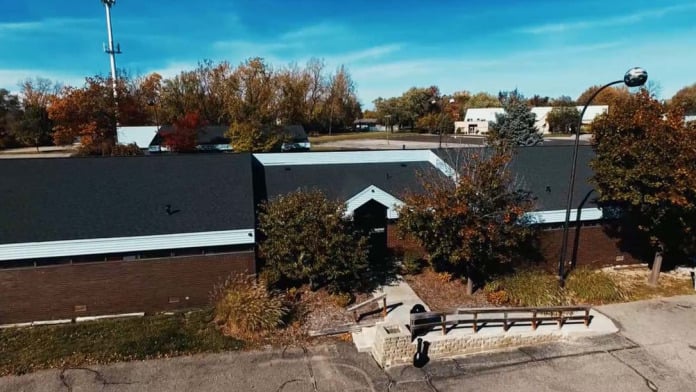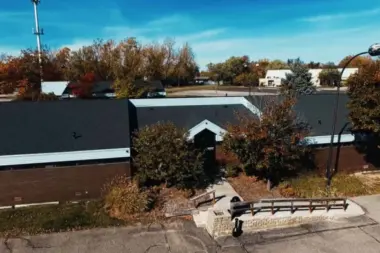About Sacred Heart Rehabilitation Center Flint Outpatient Recovery & Wellness
For men and women facing substance use and co-occurring mental health challenges in Flint, Michigan, Sacred Heart Rehabilitation Center – Flint Outpatient Recovery & Wellness has long been a trusted space to feel seen and supported. With a team renowned for clinical excellence and heartfelt care, the facility cultivates a recovery space where dignity and personal growth come first. They’re located along Professional Drive in Flint, about two miles southwest of Kearsley Park, the Flint Institute of Arts and the Flint Cultural Center.
This facility embodies Sacred Heart’s mission to help individuals achieve balanced and sustained recovery that fosters resilience and renewed purpose. They often achieve this goal through integrated care packages that blend medication assisted treatment (MAT) with outpatient therapy, HIV/AIDS services and comprehensive case management. Clients have the flexibility to choose between in-person therapy or comprehensive statewide telehealth services for added convenience and accessibility.
Specialized Services
They welcome individuals from diverse backgrounds and unique challenges from those living with HIV/AIDS and LGBTQ+ community members to veterans and people navigating legal issues. Dedicated support is available to pregnant and postpartum women with an emphasis on strengthening maternal resilience, ensuring safe pregnancy outcomes and building parenting skills.
Affordable Treatment
The facility champions low-cost care by accepting Medicaid, Medicare and several commercial health insurance options. Block grants and other financial assistance may also be used to offset treatment costs if you’re uninsured.
All-Inclusive Opioid Recovery
At Flint Outpatient, your journey to whole-person healing begins with a thorough intake assessment that guides personalized care planning to ensure dedicated support at all stages. This plan may include prescribing buprenorphine or naltrexone through MAT to ease withdrawal symptoms and curb physiological cravings. Alongside the medication, you’ll engage in recovery-focused therapy to address underlying psychological triggers, build effective coping strategies and strengthen your commitment to sustained healing.
To ensure holistic support, they blend the self-help principles of Alcoholics Anonymous with recreational activities and proven models like cognitive behavioral therapy. Specialized therapeutic support may be available for HIV/AIDS patients to navigate the emotional impact of diagnosis and build strategies that support treatment adherence and long-term wellness.
The broader program may integrate psychiatric medication management to address co-occurring mental challenges and enhance emotional stability. Wraparound services include support with accessing medical care, food and transportation alongside education, housing and emergency financial assistance.
Latest Reviews
Rehab Score
Gallery


Accepted Insurance
Other Forms of Payment
Private insurance refers to any kind of healthcare coverage that isn't from the state or federal government. This includes individual and family plans offered by an employer or purchased from the Insurance Marketplace. Every plan will have different requirements and out of pocket costs so be sure to get the full details before you start treatment.
Self-pay involves paying for treatment out of your own pocket. You can use savings or credit, get a personal loan, or receive help from family and friends to fund your treatment. If you don't have insurance or your insurance plan doesn't cover a specific program, self-pay can help ensure you still get the care you need.
Military members, veterans, and eligible dependents have access to specific insurance programs that help them get the care they need. TRICARE and VA insurance can help you access low cost or no cost addiction and mental health treatment. Programs that accept military insurance often have targeted treatment focused on the unique challenges military members, veterans, and their families face.
Medicaid is a state based program that helps lower-income individuals and families pay for healthcare. Medicaid covers addiction treatment so those enrolled can use their coverage to pay for rehab. When a program accepts Medicaid the client often pays very little or nothing out of their own pocket.
Medicare is a federal program that provides health insurance for those 65 and older. It also serves people under 65 with chronic and disabling health challenges. To use Medicare for addiction treatment you need to find a program that accepts Medicare and is in network with your plan. Out of pocket costs and preauthorization requirements vary, so always check with your provider.
Addiction Treatments
Levels of Care
Sacred Heart provides outpatient behavioral health services for mental health and substance use disorders for adults, family, children,adolescents, older adults, veterans, and court treatment services at several locations throughout Michigan. The services offer a course of treatment as an alternative to residential care or continuing treatment for individuals who have completed residential care. These services are specifically tailored to promote the recovery of each individual client.
Sacred Heart addresses the need for safe, medically monitored detoxification that stems from the dangerous physical symptoms that can accompany withdrawal. Depending on the nature of the drug of choice, the pattern of use and the medical history of the client, withdrawal can be traumatic to critical body functions and systems. They can treat the symptoms of withdrawal in a safe environment that is equipped and staffed for the effective management of those symptoms. Providing these necessary elements they can assist a client in completing a safe detoxification. safe detoxification.
Clients in inpatient rehab reside at the treatment facility while engaging in intensive daily treatment. Inpatient care is primarily designed for clients leaving detox, those in early recovery, and those at an elevated risk of relapse. Clients participate in intensive addiction counseling, which may include group and family therapy as well as one-on-one sessions. Recovery-focused life skills training is also often prioritized. Many inpatient rehabs offer evidence-based complementary therapies, such as yoga, meditation, art therapy, and animal therapy.
Treatments
The goal of treatment for alcoholism is abstinence. Those with poor social support, poor motivation, or psychiatric disorders tend to relapse within a few years of treatment. For these people, success is measured by longer periods of abstinence, reduced use of alcohol, better health, and improved social functioning. Recovery and Maintenance are usually based on 12 step programs and AA meetings.
Drug rehab in Michigan provides personalized treatment to help individuals break this cycle and regain control of their lives. Treatment methods are used in various levels of care, including inpatient rehab, partial hospitalization programs, intensive outpatient programs, and standard outpatient treatment.
Many of those suffering from addiction also suffer from mental or emotional illnesses like schizophrenia, bipolar disorder, depression, or anxiety disorders. Rehab and other substance abuse facilities treating those with a dual diagnosis or co-occurring disorder administer psychiatric treatment to address the person's mental health issue in addition to drug and alcohol rehabilitation.
A combined mental health and substance abuse rehab has the staff and resources available to handle individuals with both mental health and substance abuse issues. It can be challenging to determine where a specific symptom stems from (a mental health issue or an issue related to substance abuse), so mental health and substance abuse professionals are helpful in detangling symptoms and keeping treatment on track.
Opioid rehabs specialize in supporting those recovering from opioid addiction. They treat those suffering from addiction to illegal opioids like heroin, as well as prescription drugs like oxycodone. These centers typically combine both physical as well as mental and emotional support to help stop addiction. Physical support often includes medical detox and subsequent medical support (including medication), and mental support includes in-depth therapy to address the underlying causes of addiction.
Programs
Adult rehab programs include therapies tailored to each client's specific needs, goals, and recovery progress. They are tailored to the specific challenges adult clients may face, including family and work pressures and commitments. From inpatient and residential treatment to various levels of outpatient services, there are many options available. Some facilities also help adults work through co-occurring conditions, like anxiety, that can accompany addiction.
Serving in the military is both mentally and physically challenging, and can result in trauma that persists even after combat ends. Military programs are tailored to the specific and often complex needs of active duty personnel, veterans, and military families. Clients often access these programs through the U.S. Department of Veterans Affairs (VA).
Young adulthood can be an exciting, yet difficult, time of transition. Individuals in their late teens to mid-20s face unique stressors related to school, jobs, families, and social circles, which can lead to a rise in substance use. Rehab centers with dedicated young adult programs will include activities and amenities that cater to this age group, with an emphasis on specialized counseling, peer socialization, and ongoing aftercare.
Rehabs for women provide a safe, nurturing space for female clients to heal. These treatment programs consider the specific obstacles that women can face during recovery and place a special emphasis on mental, social, physical, and reproductive health. They explore how each woman's experience has shaped the trajectory of their substance use, addressing issues such as sexual abuse and past trauma.
HIV/AIDS programs support disease prevention and management in high-risk individuals in recovery. Individuals who engage in intravenous drug use and other addictive behaviors are at a higher risk of becoming infected with HIV. Rehab centers that specialize in treating this population typically have a high number of nurses, physicians, and psychiatrists on staff who can make sure both their medical and mental health needs are met.
Clinical Services
Group therapy is any therapeutic work that happens in a group (not one-on-one). There are a number of different group therapy modalities, including support groups, experiential therapy, psycho-education, and more. Group therapy involves treatment as well as processing interaction between group members.
In individual therapy, a patient meets one-on-one with a trained psychologist or counselor. Therapy is a pivotal part of effective substance abuse treatment, as it often covers root causes of addiction, including challenges faced by the patient in their social, family, and work/school life.
Recreational therapy helps to build healthy habits and discover new interests that can reduce your cravings and your exposure to alcohol and drug triggers. Activities may include physical fitness, gardening, group games, and team sports. These promote relaxation, improve your mood, and encourage social interaction. Each of these is crucial to sustain long term recovery.
Family therapy is often recommended for family units with a member undergoing drug or alcohol rehabilitation. Family therapy helps to foster communication and conflict resolution that creates a supportive environment. This helps the loved one who is struggling with addiction.
During motivational interviewing, therapists express empathy, support self efficacy, and develop discrepancies. By using these techniques, therapists help clients reflect on their desires for change and understand why and how they should move forward with those changes.
Amenities
-
Residential Setting
-
Private Setting
Staff & Accreditations
Staff
Paula Nelson
President & CEO
Pam Ardoin
CFO
Denise Verschure
COO
Estee Weber
Chief Technology & Innovation Officer
Carolyn Parasick
VP of Human Resources
Tammy Murray
Director of Engagement & Recipient Rights Officer
Dr. Janice Romanik
Medical Director
Accreditations

The Commission on Accreditation of Rehabilitation Facilities (CARF) is a non-profit organization that specifically accredits rehab organizations. Founded in 1966, CARF's, mission is to help service providers like rehab facilities maintain high standards of care.
CARF Accreditation: Yes
Accreditation Number: 203826

The National Association of Addiction Treatment Providers (NAATP) is a professional association that represents organizations in the field of addiction services. Founded in 1978, NAATP's mission is to advance addiction services and ensure that high-quality addiction treatment is available and accessible.
NAATP Member: Yes

The Joint Commission, formerly known as JCAHO, is a nonprofit organization that accredits rehab organizations and programs. Founded in 1951, the Joint Commision's mission is to improve the quality of patient care and demonstrating the quality of patient care.
Joint Commission Accreditation: Yes

The Substance Abuse and Mental Health Services Administration (SAMHSA) is a branch of the U.S. Department of Health and Human Services. Established in 1992 by congress, SAMHSA's mission is to reduce the impact of substance abuse and mental illness on American's communities.
SAMHSA Listed: Yes
Contact Information
2091 Professional Dr
Ste D
Flint, MI 48532




